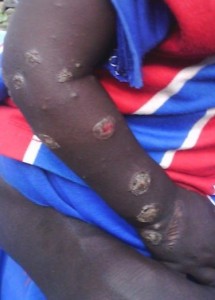The Cost of Ignoring Chemical Warfare in Darfur
Bijan Razzaghi

Bloody vomiting, difficulty breathing, diarrhea, rashes on the skin, miscarriage among women and loss of vision. These are some of the symptoms described by the victims of chemical attacks in Jebel Marra, a region in Darfur, Sudan. According to a report published by the nonprofit Amnesty International, more than 30 chemical attacks were carried out by the Sudanese government in the area of Jebel Marra in 2016 – as recently as September. The strikes claimed the lives of at least 250 innocent civilians, including many children, and continue to cause pain and suffering. Reports coming from the ground indicate that many individuals are still dealing with health complications stemming from the chemicals.
The government has denied independent investigators access to the areas affected, and therefore a thorough investigation into the chemical weapons use in Darfur is still pending. However, photographs and testimonies from victims suggest that the chemical of choice for these vicious attacks was blister agent (also known as mustard gas) – a compound of sulfur mustard and nitrogen mustard. The substance, used by Saddam Hussein against Iran and the Kurds in the 1980s, can cause blistering and peeling of the skin, respiratory distress, and loss of vision. The compound is not an instant killer, but it can trigger long-term health complications that can eventually be fatal. In other words, deaths caused by this agent are slow and painful – making it the most cruel war weapon in the market.
The compound was most likely delivered through artillery shells or aerial bombs dropped by Sudanese Air Force planes SU-24s, SU-25s, and A-5s. It is widely known that these aircraft were provided by Russia and China, and that they are capable of carrying these types of chemical bombs. The planes have been spotted in airfields located in the cities El Fesher and Nayala – which is in itself a problem. Their presence violates the United Nations Security Council’s (UNSC) resolution 1556, which states that no military aircraft should be operating in the Darfur region.
Fighting Impunity
Although there is no physical evidence of the attacks in Darfur, there is little doubt that they took place. Among the 56 witnesses featured in Amnesty International’s report, many described bombs falling from the sky that exploded into “a toxic cloud of smoke.” This description matches other accounts of chemical weapons recorded in different parts of the world. Other than that, it is hard to believe that hundreds of people in Darfur would lie about what they saw and experienced, as well as the resulting health issues that affects them to this day.
These tragic testimonies should have been enough to make the international community demand justice and accountability for these crimes. In the least, they should have sparked sufficient outrage for the United Nations to demand immediate access for an independent investigation in the area. However, there has been little to no reaction from most world leaders, including the United States. It is surprising, considering that three years earlier a similar event occurred in Syria and there was a major reaction, even resulting in the destruction of that country’s chemical weapons. Why is Sudan an exception?
It is particularly important that the international community be reminded that the chemical weapons attacks in Darfur violate the Chemical Weapons Convention (CWC), an arms control treaty supported by the United Nations (UN) that forbids the production, stockpiling and use of chemical agents. Furthermore, they violate the laws of war determined by the Geneva Convention, specially the ones that protect civilians and civilian objects. And lastly, the use of chemical weapons by the Sudanese government demonstrates a blatant disregard for human life and the wellbeing of citizens living in Darfur and the the values that the Geneva Convention has preached.
It is time that this issue be treated with the seriousness that it deserves. The victims’ accounts need be taken into consideration as evidence. The United Nations (UN), the United States and member states of the Organisation for the Prohibition of Chemical Weapons (OPCW) must demand immediate access to the areas affected for an independent investigation. The Sudanese government should be held to the same standards as other leaders who have committed similar crimes. It is morally and legally imperative to apply appropriate measures on the chemical attacks in Darfur, and to ensure that perpetrators pay for their crimes.
Ignoring serious crimes such as genocide and the use of chemical weapons will not only embolden criminals like President al-Bashir of Sudan, but will also further erode international norms and put our institutions’ competency in question.



